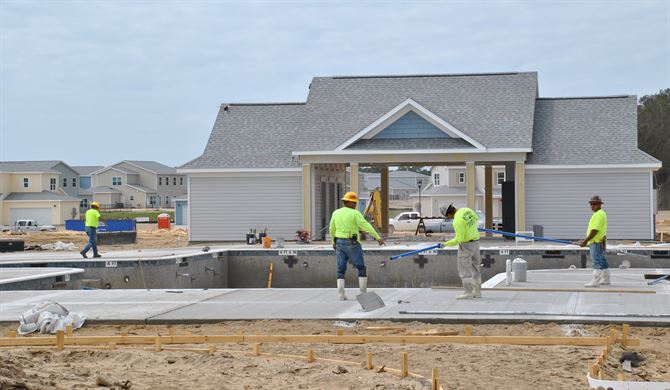BLOG
The Best Seasons for Concrete Contractors to Pour Concrete
by TRP Ready Mix on April 23, 2017
A Look at the Best Times of the Year to Hire Concrete Contractors for your Concrete Pouring Project
When working on poured concrete projects, you want to make sure that it will set properly, so that it will be strong and have a longer lifespan. There are certain weather conditions that will compromise concrete when it is setting, therefore it is important to choose a safe time for pouring. If it is too hot, too cold, too wet, or too windy, it will be at risk of damage, so make sure to check the weather and plan ahead with concrete contractors. If it happens to become unexpectedly hot or cold, they’ll know how to get the job done well without compromising strength or durability.
Late spring, summer, and early fall are all typically good seasons for pouring concrete, however you must keep an eye on the weather before and during the project. In the spring and fall, avoid rainy days and temperatures below 10˚C. In the summer, avoid hot and humid heat waves and temperatures above 30˚C. If it’s too hot, water will evaporate from the concrete and the top layer will dry too quickly. If it’s too cold, the concrete won’t set, or it will set very slowly. The water in the concrete can freeze, making concrete more prone to cracking. Either way, the concrete will not set well and become weak in extreme temperatures.
If you must pour concrete in extreme temperatures, follow these tips:
During cold weather, keep the dry concrete mix in a warm area prior to mixing. In this weather, professional concrete contractors mix the concrete with hot water to avoid freezing and to set it quickly. Also, there are quick setting concrete products available if you must pour concrete in cold weather. After the concrete has stiffened, cover it with a special concrete setting blanket.
During hot weather, keep the dry concrete mix in a cool area prior to mixing. Mix the concrete with the coldest water possible. Good concrete contractors will often use ice to slow down the setting and drying of the concrete in hot weather. After pouring, keep the concrete moist by spraying it with a hose, setting a sprinkler beside the slab, or covering it with wet burlap. You may need to keep adding moisture to the concrete for a few days if the weather is extremely hot.
The ideal weather to pour concrete is dry with minimal wind and temperatures between 10˚C and 30˚C. However, aim for temperatures in the low 20s to be safe. May and June are often safe times to pour concrete, as is September. If you must pour concrete on extremely hot or cold days, contact your concrete contractors. They will know how to properly store, mix, and pour the concrete without compromising its strength and lifespan.

